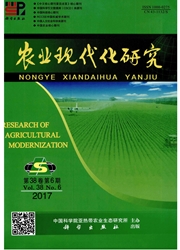

 中文摘要:
中文摘要:
禽流感疫情损失补偿政策结果直接改变养殖户的成本与收益,从而影响养殖主体的销售行为。利用宁夏中卫实地调研数据资料,在对禽流感疫情暴发后疫区养殖户不安全销售行为特征分析的基础上,采用Tobit模型,分析养殖户不安全销售行为影响因素,探讨疫情损失补偿政策对养殖户不安全销售行为抑制效应。结果表明,样本养殖户中出售病死鸡的比例较高,73.32%的养殖户将30%以上的病死鸡销售到市场中;预期疫情严重程度和预期疫情传播程度显著正向影响养殖户的不安全销售行为;劳动力数量、政府惩罚风险、补偿额度满意度、补偿速度满意度、补偿范围满意度显著负向影响养殖户的不安全销售行为;补偿政策(补偿额度、补偿速度和补偿范围)抑制养殖户的不安全销售行为,但抑制效果有待提高。因此,需要通过完善疫情补偿政策、加强政府监管力度和提高养殖户对疫情认知等措施来实现。
 英文摘要:
英文摘要:
The avian influenza compensation policy can change the costs and benefits of farmers directly, which affects farmers' sales behaviors. Based on the survey data in Zhongwei of Ningxia Province and applying the Tobit model, this paper analyzes the characteristics of farmers' unsafe sales behaviors after the outbreak of the avian influenza and explores the factors influencing farmers' unsafe sales behaviors. Results show that 1) the percentage of farmers who sell dead chickens is high and 73.32% of famers sell more than 30% chickens to the market; 2) the expectation of severity and spread of epidemic disease outbreak has significant positive influence on farmers' unsafe sales behaviors; 3) the labor number, the risk of government punishment, the satisfaction of compensation standards, the satisfaction of compensation rate, and the satisfaction of compensation scope have significant negative influences on farmers' unsafe sales behaviors; and 4) the epidemic compensation policy including the compensation standards, the compensation rate and the compensation scope can reduce farmers' unsafe sales behaviors, but need to be improved. Therefore, it is necessary for improving the effects of compensation policy by further perfecting this policy, strengthening government regulation and enhancing farmers' cognition of epidemic diseases.
 同期刊论文项目
同期刊论文项目
 同项目期刊论文
同项目期刊论文
 期刊信息
期刊信息
